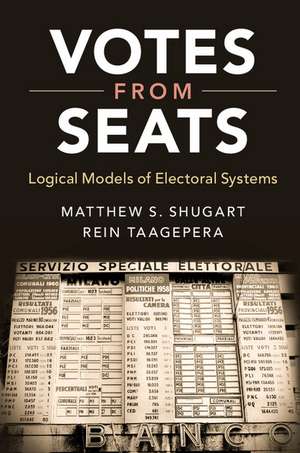Votes from Seats: Logical Models of Electoral Systems
Autor Matthew S. Shugart, Rein Taageperaen Limba Engleză Paperback – 5 oct 2017
| Toate formatele și edițiile | Preț | Express |
|---|---|---|
| Paperback (1) | 238.78 lei 3-5 săpt. | +18.98 lei 6-10 zile |
| Cambridge University Press – 5 oct 2017 | 238.78 lei 3-5 săpt. | +18.98 lei 6-10 zile |
| Hardback (1) | 690.63 lei 6-8 săpt. | |
| Cambridge University Press – 18 oct 2017 | 690.63 lei 6-8 săpt. |
Preț: 238.78 lei
Nou
Puncte Express: 358
Preț estimativ în valută:
45.69€ • 47.92$ • 38.04£
45.69€ • 47.92$ • 38.04£
Carte disponibilă
Livrare economică 12-26 martie
Livrare express 25 februarie-01 martie pentru 28.97 lei
Preluare comenzi: 021 569.72.76
Specificații
ISBN-13: 9781108404266
ISBN-10: 110840426X
Pagini: 360
Ilustrații: 52 b/w illus. 48 tables
Dimensiuni: 152 x 228 x 20 mm
Greutate: 0.49 kg
Editura: Cambridge University Press
Colecția Cambridge University Press
Locul publicării:New York, United States
ISBN-10: 110840426X
Pagini: 360
Ilustrații: 52 b/w illus. 48 tables
Dimensiuni: 152 x 228 x 20 mm
Greutate: 0.49 kg
Editura: Cambridge University Press
Colecția Cambridge University Press
Locul publicării:New York, United States
Cuprins
1. Introduction: how electoral systems matter – for politics and for the scientific study thereof; Part I. Rules, Tools, and Context: 2. Components of simple electoral systems; 3. Components of complex and composite electoral systems; 4. The number of parties and proportionality – two key tools for analysis; 5. Examples of electoral systems: nationwide PR in Israel and FPTP in Trinidad and Tobago and India; 6. Two districted PR and list type: Finland, Portugal, and other cases; Part II. The Interparty Dimension of Assembly Politics: The Seat Product Model: 7. The seat product model of the effective number of assembly parties; 8. Winners plus one: how we get votes from seats; 9. Basic laws of party seats and votes - and application to deviation from proportionality; 10. All politics is national? How 'embeddedness' in a national assembly system shapes votes and seats in a district; Part III. Bringing the President In: 11. Coattails upside down: how assembly elections shape presidential elections; 12. How election timing matters in presidential democracy – and how it does not; Part IV. The Intraparty Dimension of Representation: 13. How electoral systems shape candidate vote shares; 14. Pooling or its absence: nomination and alliance behavior; Part V. What Can We Expect From Models of Electoral Systems?: 15. Extending the seat product model: upper tiers and ethnic diversity; 16. Complexities in electoral systems: do simple models work anyway? 17. Conclusion: substance and method.
Recenzii
'Set against today's emotionally charged issues of Russian misinformation attacks seeking to manipulate the 2016 and subsequent election cycles, and the Gerrymandering case currently in front of the US Supreme court, Votes from Seats: Logical Models of Electoral Systems is a timely and unreservedly recommended addition to both community and academic library Contemporary Political Science collections in general, and Electoral Systems supplemental studies lists in particular.' James A. Cox, Midwest Book Review
Notă biografică
Descriere
Four laws of party seats and votes are constructed by logic and tested, using physics-like approaches which are rare in social sciences.
